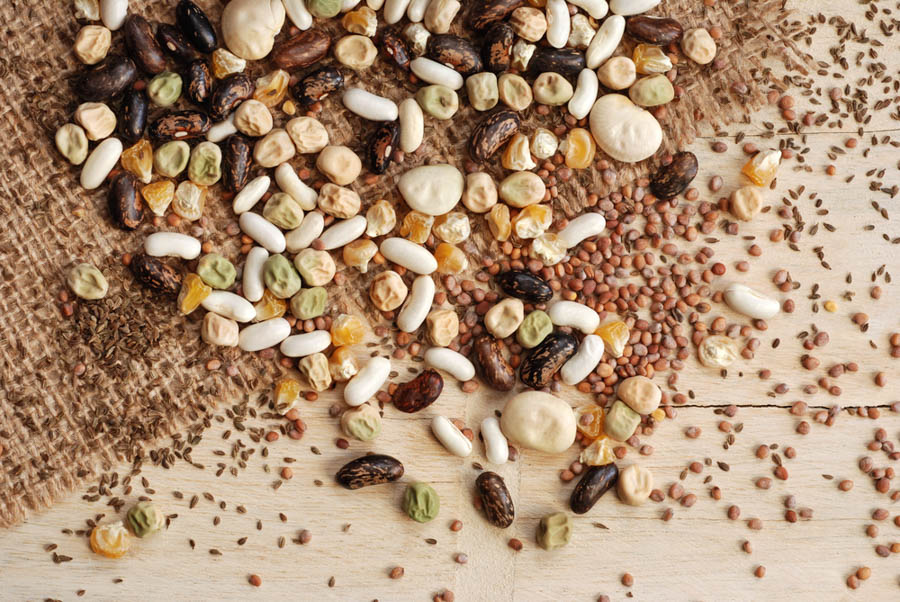Common Terms for Seeds and What They Mean

It is easy to be confused by the many different common term for seeds used in seed catalogs, on gardening websites, and in gardening periodicals. An accurate understanding of common terms for seeds will help you to decide what qualities are important to you and, accordingly, which seeds you should purchase and grow in your garden.
GardenZeus generally recommends open-pollinated, untreated, organically grown seeds for use in home gardens, with exceptions for specific or challenging situations, such as hybrid tomato seeds when high yields are needed in limited space or hybrid summer squash seeds when mildew resistance is needed for growing near the coast. For specific recommendations for seed varieties by plant and zip code, go to GardenZeus and browse plants for recommended seed varieties that have been vetted and approved by GardenZeus experts. Many recommended varieties are linked directly to vendor websites.
Open-pollinated (OP): Open-pollinated seeds reproduce true-to-type. As long as plants do not cross-pollinate with other varieties, seeds in each new generation will produce plants, vegetables, or flowers that are the same or similar to the parent, so they are ideal for seed saving.
Heirloom: An heirloom is an open-pollinated variety that has been in cultivation for decades – usually at least 50 years. The staying power of heirloom varieties often results from exceptional characteristics, such as flavor or vigor. Many heirloom varieties predate the advent of large-scale chemically-dependent agriculture, and are a natural match for small-scale organic gardening. All heirloom varieties are open-pollinated, but not all open-pollinated varieties are heirloom.
Hybrid (F1) or (F2): A hybrid is the offspring of two different varieties of the same species of plant, or of closely related species of plant. The positive characteristics of hybrids result from an intentional or controlled crossing of distinct genetic strains. For example, hybrids are often bred to have resistance to certain diseases or to tolerate adverse growing conditions. Hybrids do not reproduce true-to-type; offspring or seeds from a hybrid usually will NOT produce similar plants, vegetables, or flowers as the parent, so for most gardeners they are not worthwhile for saving seeds. “F1” means that a single generation or one reproductive cycle with 2 different parents was needed to produce the hybrid seeds. “F2” hybrids required a second generation in which the F1 hybrid was again crossed with another strain.
Certified Organic: Organic seeds must meet the same requirements as organic food; the seeds must be grown in an approved manner and be certified to be sold as organic. The land on which the seeds are produced cannot have been treated with prohibited substances for three years prior to harvest. Most pesticides constitute prohibited substances. A few biological treatments and allowed synthetic substances can be applied to organic seeds. Whether a seed is open-pollinated, an heirloom, or a hybrid says nothing about whether it is organic. Certified organic seeds cannot be genetically modified.
Genetically modified (GM or GMO): GMO seeds are produced using high-tech “recombinant” methods that insert genes from one plant, or genes from a bacterium or other microorganism, an animal, or even a synthetically created gene, into genes of an existing plant. These seeds are engineered to have specific characteristics, such as resistance to herbicides. Genetically modified seeds are generally not sold directly to home gardeners, and most seed vendors for home gardeners have pledged to sell only non-GMO seeds. There is debate and concern about open-pollinated strains of some agricultural crops accidentally acquiring genes from GMO crops, especially for widely planted genetically modified vegetables or grains, such as corn. Corn easily cross-pollinates, and can cross with other corn varieties at distances of two miles or more, making it difficult to ensure genetic purity in areas where many varieties of corn are grown. Home gardeners concerned about growing plants without genetic modifications should be particularly careful about their seed sources as some seed companies are much more diligent about ensuring pure non-GMO seed stocks than others. Many seed companies have expressed their commitment to pure seed stocks by signing the Safe Seed Pledge, a promise that they will not knowingly “buy or sell genetically engineered seeds or plants.” A genetically modified seed cannot be a hybrid, open-pollinated, or an heirloom. Just because seeds are not certified as organic does not mean they contain material resulting from genetic modification. The FDA maintains that genetically modified vegetables and grains are safe for consumption; others remain concerned.
Treated: Treated seeds have had chemical(s), usually fungicides or bactericides, applied to them before they are packaged. The chemical treatments may increase germination rate or minimize spread of disease in seedlings, among other purposes. Commercial nonorganic growers may prefer treated seeds. Home gardeners usually prefer untreated seeds. Seed descriptions normally indicate whether the seeds are treated. Treated seeds cannot be certified organic.
Pelleted: Pelleted seeds are coated with inert materials, usually clay, which soften or dissolve when moistened. The main purpose for this is to increase seed size and provide uniformity so that tiny individual seeds are easier to handle and plant. Pelleted seeds allow commercial growers to plant in precise locations with exact spacing using mechanical equipment. Onions, lettuce, and tomato seeds are examples of seeds that are pelleted for easier planting. Seeds pelleted with certain approved substances can be certified organic.
GardenZeus has comprehensive, customized growing information by plant and zip code. To get started, enter your zip code here.
Chlorine contained in municipal water supplies is a common concern for gardeners. Darren discusses possible solutions in the following posts: